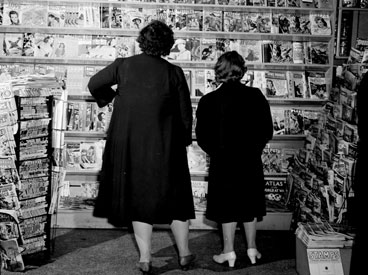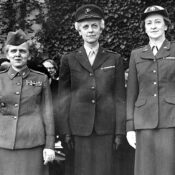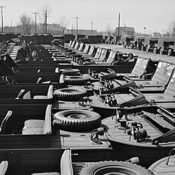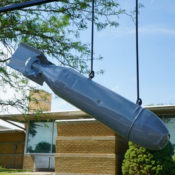When I’m interviewed as the Post’s archives director, I often find myself addressing the misconception that the magazine was a newsmagazine. Actually, it was more of a general interest magazine that occasionally ran feature stories on current events. It didn’t run headlines, and it printed very few photographs compared to, say, Life magazine. And because its production time was so lengthy, it might not be able to comment on a news story for several weeks.
So, when war was declared in Europe on September 2, 1939, five weeks passed before the Post made any direct reference to it. And it did so in an unusual editorial entitled “America.” In it, the editors declared World War a misnomer for what had just erupted in Europe. “It is, in fact, again what it was before — a European war.”
This editorial was the first of many to argue that the fighting in Europe did not, and should not, involve America. The Post editors, like many Americans, were still bitter about America’s involvement in the last war. “Twenty-two years ago,” they wrote, “we were [fighting] on the continent of Europe, saying to ourselves, and believing, that we had engaged in a war to end war. It sounds ironic now. Nevertheless, it is one of the romantic facts to be written down in history that we had no other purpose. We were defeated. We were defeated because it was not our war. It was Europe’s war, and the peace that was written was a European peace, laying down the lines for the next war.”
Not only had that war cost America 116,000 dead and 204,000 wounded, it had also involved $10 billion in loans to allies and post-war relief aid, which it had trouble getting back.
The Post was far from alone in its isolationist attitude. But over the next two years, the editors had reasons to reconsider the Nazi threat as they watched Germany conquer one nation after another and savagely abuse the vanquished nations. Shortly before Japan had attacked Pearl Harbor, the editors conceded that remaining isolated might not be feasible; we could try to avoid the war, but the war would eventually catch up with us.
The “America” editorial proved farsighted on one point. It argued that during the First World War “the world’s center of political gravity shifted from one continent to another — that is to say, from Europe to America.” England and France were trying to hold onto the “star of world supremacy” while Germany was trying to seize it. In fact, the editors wrote, that star “is not there. It is here.” The Post had recognized America’s new global power, years before its victory in the war made it obvious to the world.
On another point, though, the editors’ conclusion wasn’t quite as perceptive. The editors didn’t yet see that America couldn’t hold onto “world supremacy” and not get involved in this war.
Become a Saturday Evening Post member and enjoy unlimited access. Subscribe now




Comments
In response to Jim Doherty’s questions:
The Post, though strongly isolationist, was not averse to publishing war stories. In fact, they were publishing war stories about the Royal Navy as early as October 1939.
The editors had their political opinions, but they were also businessmen, and would publish a story if it was good, regardless of whether it supported their politics.
As to the second matter, you’re right to connect the Anti-Comintern Pact and Japan’s move into China. But Japan had been in Manchuria since 1931, and had every intention of moving south as soon as the opportunity presented itself.
The pact with Germany gave it a sense of needed security. Japan was continually worried that its forces in China were vulnerable to a sudden attack from Russia. With the agreement with Germany, it gained an ally who was just as dedicated to defeating Russia, and so they felt encouraged to move ahead their invasion.
But the connection between the Asian and European wars was really more a matter of opportunism than shared principles. When Hitler saw advantages in making peace with Russia, just before his Polish invasion, he turned his back on the Anti-Comintern Pact, causing much consternation in Tokyo.
Months before, Japan had been invited to join Germany and Italy in the “Pact of Steel,” but Japan wanted the signees to identify the Pact’s chief enemy as Russia. Germany and Italy were focused on France and Great Britain, instead. So Japan just walked away.
There may have been connections between the Axis partners, but it was hardly a coordinated alliance… more a matter of independent nations seizing opportunities the others created. They supported each other to the extent that it served their own purposes. They remained quite independent otherwise, which was why Hitler was surprised by the Pearl Harbor attack. There was a war in Europe and another war in Asia, but only expediency united the two.
However I should add that, in the years leading up to the war, Americans came to regard the threat from Nazi Germany and from Imperial Japan as a sort of combined enemy.
At least that’s how I see it.
Were any of the US magazines, similar in format to the SEP, more sympathetic to the war against the Axis? Were any of the other general interest magazines, such as COLLIER’S, LIBERTY, THE AMERICAN, etc., less likely to be towing the “America First” line?
I’m writing a story about a Royal Navy officer who writes on the side (sort of like Frank Wead), who writes a novel about a duel between a destroyer and a U-boat based on an actual battle he’s fought as the captain of the destroyer (similar to Denys Raynor’s THE ENEMY BELOW). It doesn’t sound like he’d be likely to make a serial sale to the POST, prior to America’s entry. How about to COLLIER’S, which was publishing articles by Winston Churchill even before England’s entry into the war?
On another subject altogether, given that Japan’s invasion of China followed so closely on its signing the Anti-Comintern Pact with Germany, and later Italy, how was it that the world was so slow in connection the Asian and European wars?